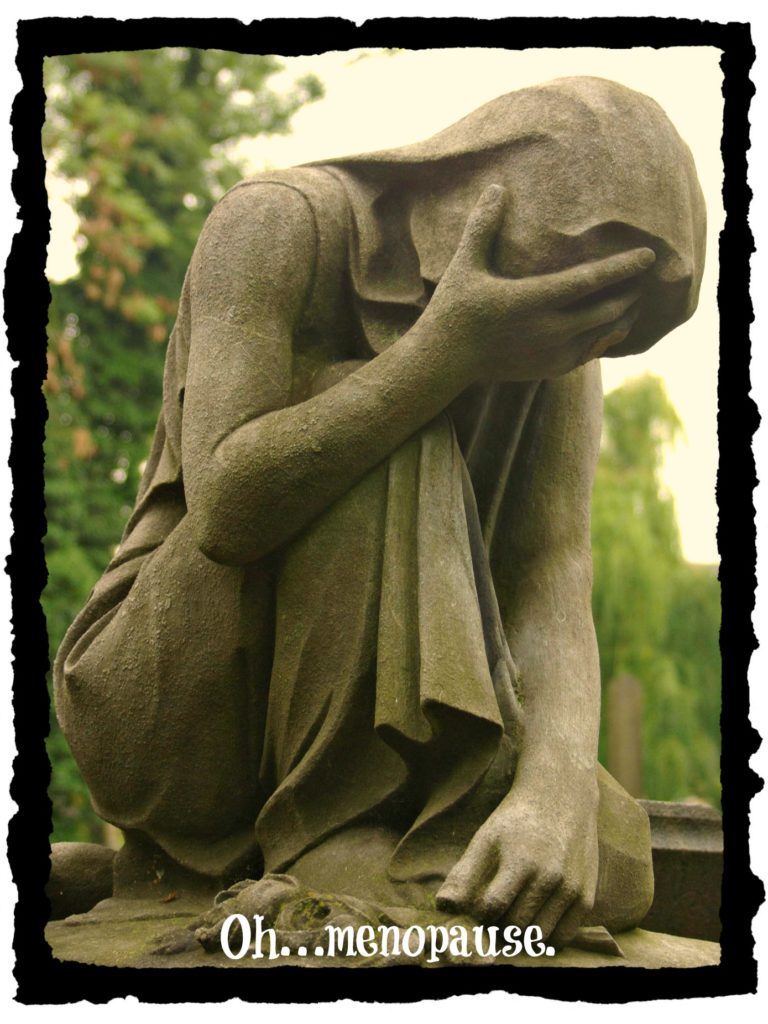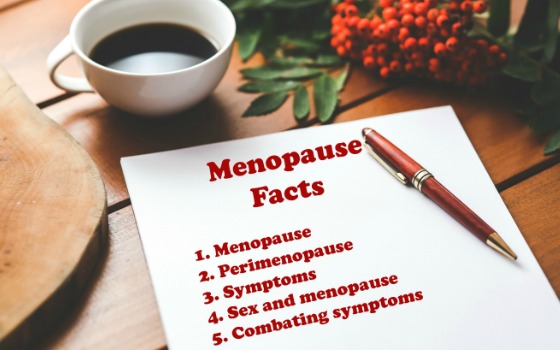Menopause. For many women, it’s an ugly word. Along with that ugliness comes transformations within our bodies that result in everything from losing our hair to wild mood swings to the molten lava sensation that we know to be hot flashes. Let’s face it: it’s wonderful being a woman, but our change of life can make for some miserable years.

Menopause is a necessary evil surrounded by a murky gray area of uncertainty. How long will I be here? What kind of symptoms can I expect? What are my options when it comes to treatment? We all have misgivings about menopause, but where do we turn for answers?
For help with questions about menopause, Midlife-A-Go-Go turned to renowned speaker, author and health & wellness advocate, Ellen Dolgen. Ellen has appeared on “NBC Nightly News,” “The Doctors,” “The Rachael Ray Show,” Oprah Radio, NPR’s “Tell Me More,” and more. She’s been featured on HuffPost and she produces health and wellness programs for businesses, healthcare institutions and other organizations.
Ellen took time from her busy schedule to share her knowledge and wisdom on menopause. Here, she answers burning questions to help you navigate the journey.
While we may hear horror stories of women dealing with menopause issues, not every woman will have the same experience. “There is not a one-size-fits-all experience,” Ellen says. “Some women will breeze though this time in their life and others will experience symptoms that affect their quality of life.”
Disclaimer: This article should not be used as a substitute for any treatment or advice from a trained medical professional. Every woman’s menopause journey will be different. If you are having concerns with your particular circumstances in menopause, contact your doctor.
We’ve all heard of perimenopause and menopause. Can you explain what each is and when they occur in a woman’s life?
According to The North American Menopause Society (NAMS), perimenopause is defined as the “gradual transition between the reproductive years and menopause (the cessation of menstrual periods).”
We spend over half of our lives wondering where our period is, when it’s going to come, and when it will go away. It’s less like a period and more like a question mark.
Perimenopause is the six to ten “symptom laden” years before you reach menopause.
There is no right or wrong age of perimenopause and menopause. Sadly, you won’t receive a “Save the Date” to let you know when the festivities will begin.
Like a bad house guest, perimenopause arrives unscheduled, uninvited, and sticks around a lot longer than you’d like. And adding insult to injury, it tends to start a lot sooner than you might think. You might start noticing changes to your menstrual cycle or internal thermostat before you notice your first gray hair. Most women first begin to experience perimenopause in their early to mid-forties, but some women begin to have symptoms in their thirties. There are many factors that contribute to menopausal timing, including genetics, and medical and surgical history.
You are officially in menopause when you have not had a period for twelve consecutive months. (Sadly, there is no cap and gown official celebration.) If your period has stopped for eight months and then suddenly shows up again, unannounced and uninvited, when you are throwing a summer party wearing a beautiful white dress (thank you OxiClean), then you have to start the clock all over again. Remember, until you have been without a period for 12 consecutive months, you are still Fertile-Myrtle! It is important to note that the average age of menopause is 51! You are probably wondering, “why do we associate menopause with old age?” Good question! Although your menopausal journey begins when you are yount, it’s true that between the onset of your first symptoms and the point at which you hit menopause, there’s enough time for bell bottoms to be in style, go out of style, and then come back in style again!
What are some common symptoms of menopause?
As it turns out, perimenopause and menopause isn’t just the simple cessation of a bodily function. It’s your emotions, your body, and your life in general, transforming into something you’re totally unfamiliar with. You may begin to question your sanity, relationships, hormones, genetics, sex drive—everything! For a lot of women, it’s every day, all day, all-consuming hurricane of bodily betrayal; for others, it’s a mere blip on the hormonal radar. Some of the symptoms are mental/emotional and some are physical. If you have marks on this chart, it’s time to see a Menopause Specialist!
Are there symptoms that are considered atypical (like PVCs)?
Many women do experience premature ventricular contractions (PVC’s), during their menopausal journey. Many women refer to this experience as irregular heartbeats. This may be caused by a decrease in estrogen. If you are experiencing PVC’s, it is very important for you to reach out to your healthcare professional so they can determine the seriousness and the root cause. Do not assume that it is menopause related and therefore just ignore any new or recurrent irregular heartbeats, dizziness, shortness of breath or chest discomfort.
For some menopausal women, sex has become painful. Why does this occur and what can be done about it?
There’s actually a medical term for painful intercourse: Dyspareunia. If you’re experiencing pain during sex, you could be suffering from vaginal atrophy or VA (I used to think VA stood for Virginia, which ironically, is for lovers.). VA is also known as vulvovaginal atrophy or VVA. The latest appellation, courtesy of NAMS, is genitourinary syndrome of menopause (GSM), a blanket term to describe menopausal symptoms that occur to the vulva, vagina and lower urinary tract as a result of estrogen deficiency. Who makes up these terms? Once again, the vagina gets the short end of the stick! I can’t even pronounce “genitourinary”! I think NAMS should call in the Opi Nail Color Labeling Committee.
Anyway, let’s simply refer to this condition as vaginal atrophy. Vaginal atrophy is just that: a thinning of the vaginal wall thanks to a drop in levels of estrogen, whose job it is to maintain the structure and function of the vaginal wall, elasticity of the tissues around the vagina, and production of vaginal fluid.
The important thing to note is that vaginal atrophy is a chronic problem that requires ongoing treatment and IS treatable. There are many options to choose from which include moisturizers, lubricants, systemic estrogen therapy, local estrogen therapy, or a combination of several of the these. Speak to your menopause specialist about this issue! My motto is: Suffering in silence is OUT! Reaching out is IN!
Can You Talk About Hot Flashes?
If you are experiencing hot flashes, you are not alone. According to NAMS, about 75 percent of women report perimenopausal symptoms such as night sweats and hot flashes.
During perimenopause and menopause, the body’s levels of estrogen, progesterone and testosterone begin to fluctuate. When estrogen levels go down, they can trigger your body’s thermostat to send a signal that you are overheated. This causes your body to send out an all hands on deck alert: your heart pumps faster, the blood vessels in your skin dilate to circulate more blood to radiate heat, and your sweat glands release sweat to cool you even more. Like so much about the process of menopause, there is no “one size fits all” for the timing, duration, frequency or pattern of menopausal hot flashes.
These pesky flushes, flashes and night sweats can have a very negative affect on a woman’s quality of life. One of the biggest impacts is they result in sleep disturbances which then causes fatigue, irritability, forgetfulness, acute physical discomfort and negative effects on work. To put it in terms we can all relate to and understand, I was a total bitchface until I got the help I needed!
What Can Woman do to Combat the Symptoms of Menopause?
There are a wide range of possibilities for relieving different symptoms.
Diet and exercise impact our overall health. If you’re anything like me, you woke up one morning and suddenly nothing in your closet fit. Welcome to the Sisterhood of the Shrinking Pants!
Regardless of what number we see on the scale, a woman’s weight through perimenopause and menopause and is largely determined by five factors: hormones, diet, exercise, stress and genetics.
Though you may not be able to control all of these factors on your own, a healthy weight and realistic exercise program is certainly within reach.
I say stop dieting! Instead, cut back on your portions and stick to healthy eating. I am a big fan of Weight Watchers. My husband and I went online and learned the Weight Watchers healthy eating plan. We learned that we thought we were eating healthy, but in reality, we really were ingesting the wrong foods. Three years later, we are still eating WW style, snacking on fruits and vegetables all day. We are eating more, but weighing less! Works for us!
You might find that cutting back (not eliminating) on your alcohol intake will help too.
Hormones do play a role. Research shows that estrogen receptors located in the hypothalamus of the brain control food intake, energy expenditure and body fat distribution. When estrogen levels in the brain dip during menopause, this control panel increases hunger, slows metabolism and encourages fat gain around the waist. Hormone therapy could potentially be used to keep the brain’s estrogen receptors from promoting hunger, developing a sluggish metabolism and experiencing a growing waistline during menopause.
Exercising during and after menopause can help maintain the muscle and bone mass that we tend to lose rapidly after menopause. If you’re unsure of where to start, try taking a walk. While all exercise raises your fitness and feel-good endorphin levels, breaking a sweat outside has been shown to increase energy and positive thinking. At the same time, according to a review published in Environmental Science and Technology, outdoor exercise can slash tension, anger and depression even better than indoor exercising.
There is new research which found that women who are sedentary, meaning they exercised fewer than three times a week, are 28% more likely to report having severe menopause symptoms than those who exercise more. Not surprisingly, sedentary women were also 52% more likely to be obese, researchers report in an article published online January 19 in Menopause. You can read more about this in this Health News Flash.
What Advice Can You Give To Help Women Get Through The Ups and Downs of Menopause?
I think the key (to dealing with menopause) is for women to understand three things:
You are not alone!
Trust how you feel. You know when you don’t feel well.
Reach out and get the help you need and deserve.Be sure to find a good Menopause Specialist to help you on this journey. Think of this health practitioner as your menopause business partner. If your current doctor is not helping you, don’t be afraid to switch. You deserve the best.
Once you have a menopause business partner, then create your menopause boardroom! Your menopause boardroom should be comprised of people that you are around most of the time like your family, co-workers, and dear friends. Along your menopausal journey, be sure to be reach out to these folks for the love and support you need and deserve.
Don’t forget to explore Midlife-A-Go-Go for various articles on menopause and midlife issues including:
…and more!



